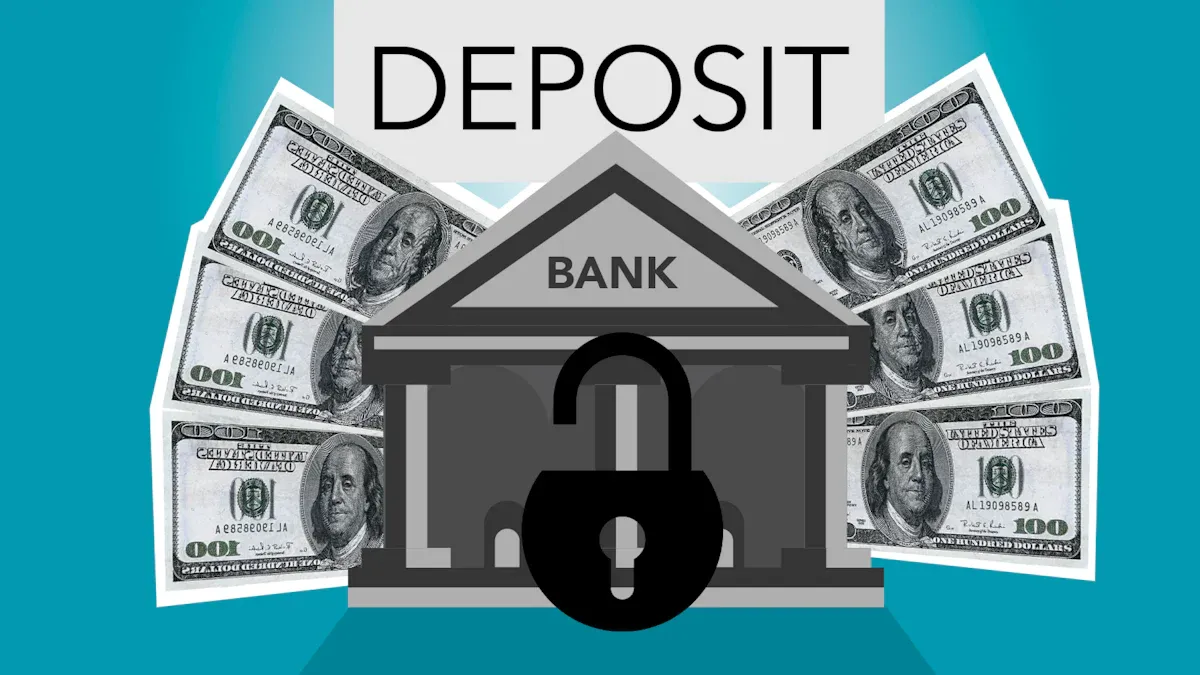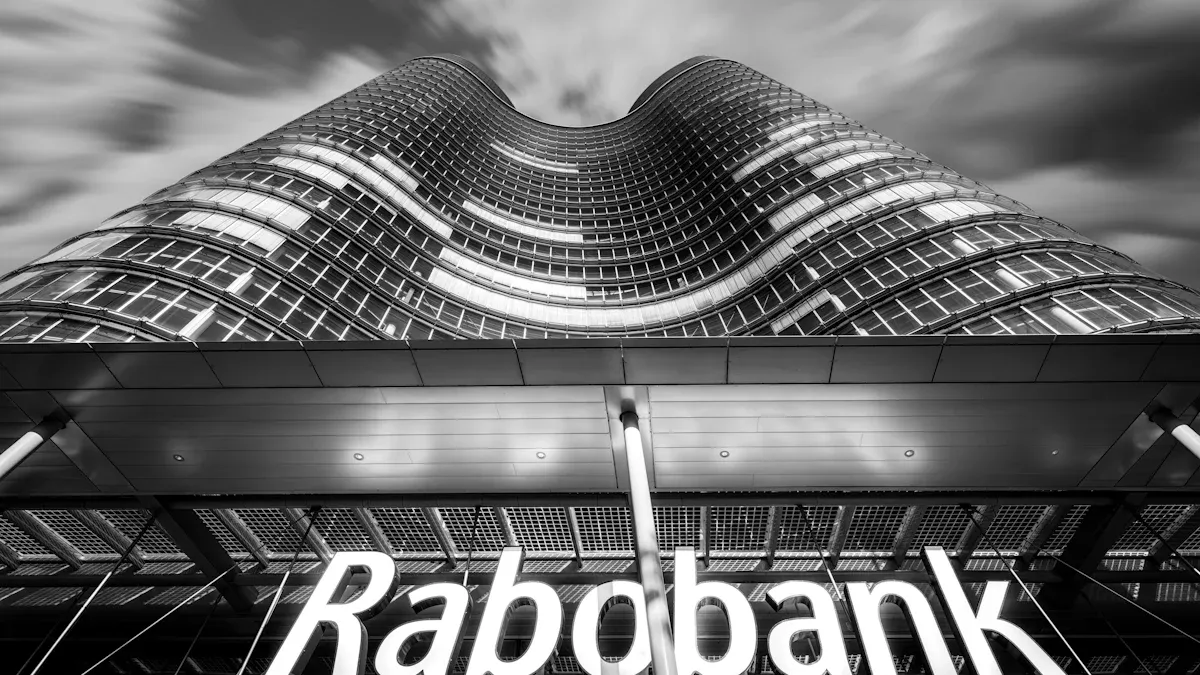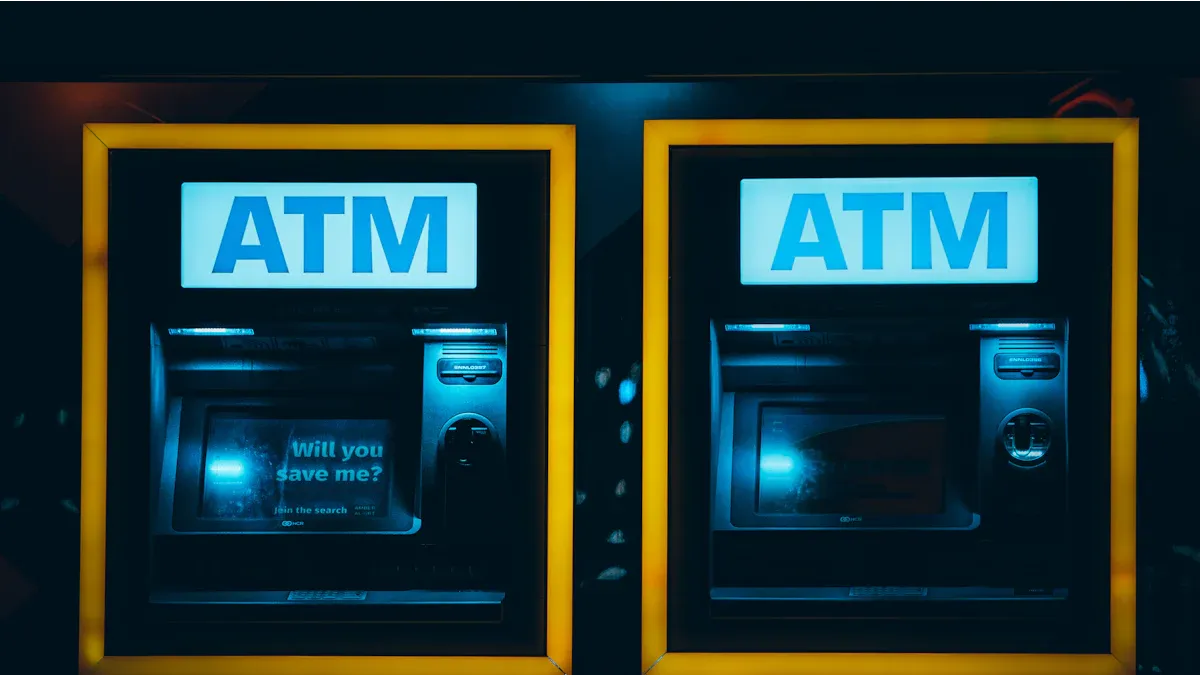- EasyCard
- Trade
- Help
- Announcement
- Academy
- SWIFT Code
- Iban Number
- Referral
- Customer Service
- Blog
- Creator
Guide to Opening a Bank Account in the Netherlands: Analysis of the Account Opening Process, Fees, and Remittance Services for Expats

Image Source: pexels
You can open a bank account in the Netherlands as long as you are 18 years old and have legal residency status. You need to prepare a valid passport, visa, and residence permit. Proof of address is also important, such as a municipal registration certificate or a rental contract. Some banks may require you to provide a Dutch local phone number and tax number. Proof of income source helps the bank understand your income and account purpose. This guide will help you complete each step smoothly.
Key Points
- To open an account in the Netherlands, you must be at least 18 years old and prepare documents such as a passport, visa, and residence permit, ensuring the information is accurate and clear.
- Choose between offline or online account opening methods; offline is suitable for complex situations, while online is faster, typically completing verification within 1-3 business days.
- When opening an account, you need to provide proof of address, such as a rental contract or utility bill, ensuring the document is recent and displays your name and address.
- Pay attention to account maintenance fees and remittance fees, choose a bank that suits your needs, and plan your fund usage reasonably.
- When making international remittances, verify the recipient’s information and fees, select an appropriate remittance method to ensure secure and efficient fund transfers.
Account Opening Guide and Process
Offline Account Opening Process
You can choose to visit a local bank branch in the Netherlands to open an account. The offline account opening process is suitable for situations requiring face-to-face consultation or complex documentation. You need to be at least 18 years old and hold legal residency status. Please prepare your passport, visa, residence permit, and proof of address in advance. Some banks may also require a Dutch local phone number and tax number.
- You need to book an appointment in advance via the bank’s website or by phone.
- Upon arriving at the bank, staff will verify all your documents.
- The bank may ask about your source of funds and the purpose of the account.
- Once the documents are approved, the bank will open an account for you and assign an IBAN (International Bank Account Number).
Tip: When opening an account offline, it’s recommended to bring all original documents and copies to avoid multiple trips due to incomplete materials.
After obtaining an IBAN, you can immediately perform transactions such as transfers, receiving payments, and making payments. Based on practical experience, banks typically complete the verification and issue an IBAN within one to two weeks after you submit complete documents. Some special cases may take longer.
| Connection Time | Description |
|---|---|
| Six months | Average time for foreigners to receive an IBAN after submitting all required documents |
Online Account Opening Process
If you want to save time, you can choose online account opening. Many Dutch banks support account opening through their official websites or mobile apps. The online account opening process is more convenient, with some banks completing it within minutes. You only need to follow the guide to upload documents such as your passport, visa, residence permit, and proof of address.
- Visit the bank’s official website or download their app, and select the “new customer account opening” option.
- Follow the instructions to fill in personal information and upload photos of required documents.
- Some banks may require video verification to confirm your identity.
- Once the documents are approved, you will receive your IBAN and account details.
The online account opening guide emphasizes the clarity and authenticity of documents. You need to ensure that uploaded files are complete and not blurry. Some banks complete verification within 1-3 business days, though rare cases may take longer. After obtaining an IBAN, you can immediately perform transfers, payments, and receiving funds.
Note: While online account opening is fast, if there are issues with documents or identity verification, the bank may require additional materials or an in-person visit for verification.
Regardless of the account opening method you choose, following the guide and preparing complete documents will significantly improve efficiency. Once you obtain an IBAN, you can seamlessly use your Dutch bank account for daily financial operations.
Documents and Eligibility
When opening a bank account in the Netherlands, you need to prepare a series of documents. Different banks may have slightly varying requirements, but most follow similar standards. You can refer to the following information to prepare all necessary documents in advance to improve account opening efficiency.
Identity Proof
You must provide valid proof of identity. Most Dutch banks accept a passport as the primary identity document. For applicants from non-EU countries, a passport is the only recognized ID. Some banks may also require a visa or residence permit to verify your legal status.
Common identity proof documents include:
- Passport (within validity period)
- Residence permit (if applicable)
- MVV (temporary residence visa, for applicants who have not yet obtained a residence permit)
You need to ensure all documents are clear and authentic. Bank staff will verify original documents and may request copies. Some banks may also require proof of registration in the Netherlands, such as university enrollment certificates or municipal registration documents.
| Document Type | Description |
|---|---|
| Valid Passport | A valid passport is required |
| Registration Proof | Proof of registration from an educational institution or municipality |
| BSN Number | Unique identification number obtained after municipal registration |
Reminder: Missing or incorrect identity documents will directly lead to account opening failure. You should carefully verify all documents to avoid delays due to minor errors.
Proof of Address
You also need to provide proof of address in the Netherlands. Banks typically require recent proof of address displaying your name and current address. Common proof includes a rental contract, utility bill, or government letters. Some banks also accept letters from hospitals or general practitioners as long as they include your address.
| Type | Specific Document Examples |
|---|---|
| Bank Documents | Bank statements, credit card statements, or other official bank letters |
| Residential Documents | Utility bills (electricity, water, gas, etc.), purchase agreements, or signed rental contracts |
| Government Documents | Letters from government or recognized public institutions, pension, unemployment, or housing benefit receipts |
| Other Documents | Letters from hospitals or general practitioners, IDs, passports, driver’s licenses, or residence permits with address |
You can choose the most accessible proof of address. Some banks may require original documents or certified copies. It’s recommended to confirm specific requirements with the bank in advance.
Additional Documents
For non-resident clients, banks may require additional documents. If you haven’t obtained a BSN number (social security number), you can use a Dutch residence permit or MVV as temporary proof. Some banks may also require you to explain your source of funds or provide a Dutch tax number.
Common additional documents include:
- Dutch residence permit (for applicants awaiting a BSN)
- MVV (temporary residence visa)
- Proof of income source (e.g., payslips, scholarship proof)
- Extract from the Personal Records Database (BRP)
You should note that banks prefer to open accounts for local residents or long-term residents. Temporary residency, unstable income sources, or lack of Dutch credit history may affect your application. If documents are incomplete or incorrect, the bank has the right to reject your application.
Note: The account opening guide recommends preparing all documents in advance and ensuring consistent information. If you encounter language barriers or don’t understand bank requirements, consider seeking translation assistance or consulting professionals.
When preparing account opening documents, ensure their completeness and accuracy. This can significantly increase your success rate and avoid rejections due to document issues.
Popular Bank Options

Image Source: pexels
In the Netherlands, you can choose from several major banks to open an account. Different banks have varying policies and services for expats. You can select the most suitable bank based on your identity, needs, and lifestyle. The following table compares the account opening policies of three major banks:
| Bank | Customer Type | Opening Method | BSN Required | Required Documents |
|---|---|---|---|---|
| ING | Full-time and exchange students | By appointment only, arranged online | No | Passport/ID, proof of enrollment, TIN (home country tax number), Dutch address (paper document) |
| Rabobank | Full-time students only | By appointment at the bank | No | Passport, residence permit, proof of enrollment, valid phone number, TIN (if available), Dutch address |
| ABN AMRO | Full-time students only | Website or app | Yes | Passport/ID, proof of enrollment, TIN (home country tax number) |
ABN AMRO
If you value personalized service and diverse financial products, ABN AMRO is a good choice. This bank is renowned for excellent customer service, offering a range of products from basic accounts to investment advice. You need to submit an account opening application through their website or app and prepare your passport, proof of enrollment, and tax number. ABN AMRO requires a BSN number, making it suitable for long-term residents who have completed municipal registration.
ING
If you prioritize digital experience and global services, ING is a great option. ING offers a robust online platform and mobile app, supporting savings, loans, insurance, and investments. You can open an account online by appointment without needing a BSN number. ING is ideal for frequent travelers or those with international business needs. The account opening guide recommends preparing all paper documents in advance to improve verification efficiency.
Rabobank
If you focus on sustainability or are involved in agriculture-related industries, Rabobank is more suitable. Rabobank specializes in agricultural financing and community services, prioritizing customer interests. You need to book an appointment at a branch and prepare your passport, residence permit, and proof of enrollment. Rabobank is ideal for farmers, agricultural businesses, and those interested in community projects.
Recommendation: When choosing a bank, consider its account opening policies, service features, and fee structures. Different banks have slightly different processes and document requirements, so choose the one that best fits your situation.
Fee Details
Account Maintenance Fees
After opening a bank account in the Netherlands, you need to pay monthly account maintenance fees. Most banks charge between €1.50 and €7, equivalent to approximately $1.65 to $7.70. This fee range is generally consistent across major banks. You can refer to the table below for the monthly fee ranges of common banks:
| Bank | Monthly Fee Range (USD) |
|---|---|
| Most Banks | $1.65 - $7.70 |
When choosing a bank, consider the account maintenance fees based on your needs and budget. Some banks offer discounts for students or specific groups.
Remittance Fees
If you need to make international remittances, banks charge different fees based on the remittance type. Euro remittances within the SEPA system (Single Euro Payments Area) are typically free. If you receive funds from outside the SEPA area, banks charge a fixed fee of approximately €6 (about $6.60). Sending euros to SEPA-compliant banks is also free, but sending other currencies or to non-SEPA regions incurs a €6 fee (about $6.60). If you choose to bear all fees, the cost ranges from $9 to $55. For example, remitting to the UK costs €15 (about $16.50).
| Remittance Type | Fee (USD) |
|---|---|
| International Remittance within SEPA | $0 |
| Incoming from Non-SEPA | $6.60 |
| Outgoing to Non-SEPA | $6.60 |
| Bearing All Fees | $9 - $55 |
| Remittance to the UK | $16.50 |
When making international remittances, it’s recommended to check specific fees in advance to avoid unnecessary expenses.
Foreign Currency Transaction Fees
When conducting foreign currency transactions with your Dutch bank account, the bank charges a percentage-based fee, typically 1% to 2.5% of the transaction amount. These fees may apply when using your bank card for purchases, online shopping, or cross-border transfers. You can check specific rates on the bank’s website or in the account agreement. Some banks set minimum or maximum fees based on the transaction type and amount.
Reminder: Before making large foreign currency transactions, consult the bank’s customer service to understand real-time exchange rates and fee policies to better plan your fund usage.
International Remittance

Image Source: unsplash
Remittance Methods
With a Dutch bank account, you can choose from several international remittance methods. Common options include:
- SEPA Transfer: Suitable for EU countries. You can transfer funds directly using an IBAN, with simple and secure operations. SEPA is similar to iDEAL, supporting interbank online payments, ideal for daily expenses and tuition payments.
- Third-Party Platforms like Wise: You can use Wise for international remittances. Wise is known for low costs, transparent exchange rates, and fast delivery. You can also open a multi-currency account with Wise to manage different currencies conveniently.
- Traditional International Wire Transfer: You can initiate wire transfers through a bank counter or online banking, suitable for large transfers or scenarios requiring specific instructions.
You can choose the most appropriate method based on the recipient’s country, delivery speed, and fees.
Operation Process
When initiating an international remittance from a Dutch bank, you typically need to complete the following steps:
- Log in to your online banking account and navigate to the international remittance or wire transfer page.
- Enter the recipient’s details, including bank name, address, recipient’s name, account type, IBAN or account number, and BIC/SWIFT code.
- Specify the remittance amount and currency, and confirm the fees.
- Verify all information and submit the remittance request with the fees.
Most international bank transfers are completed within 1 to 5 business days. The actual delivery time depends on the bank’s processing speed, time zones, and remittance timing. You can track the remittance progress on the bank’s platform.
Safety Precautions
When making international remittances, pay attention to the following safety precautions:
It’s recommended to verify the recipient’s information to ensure the IBAN and SWIFT code are accurate. Incorrect information may lead to remittance failure or delays.
You also need to be aware of remittance limits. The limits for common payment methods are as follows:
| Payment Method | Maximum Transfer Amount per 24 Hours | Maximum Transfer Amount per Transaction |
|---|---|---|
| Debit/Credit/Prepaid Card | $43,600 | $8,720 |
| iDEAL | $43,600 | $43,600 |
Before making large remittances, confirm the limits and fees with the bank. Avoid conducting remittances on public networks to protect your account security. In case of unusual deductions or information leaks, contact the bank’s customer service immediately.
Common Questions and Tips
Account Opening Misconceptions
When opening a bank account in the Netherlands, you may encounter some easily overlooked issues. Common misconceptions for expats include:
- You may not know that a BSN (local tax number) is required in advance, and without a BSN, it’s nearly impossible to open an account smoothly.
- If you are a non-resident, you may find stricter requirements for opening a bank account, especially for online applications.
- You may mistakenly assume all Dutch banks accept non-resident applications, but some banks only serve local residents or long-term residents.
It’s recommended to carefully review the bank’s requirements and prepare all documents in advance to avoid rejection due to incomplete information.
Remittance Misconceptions
When making international remittances, you may make common mistakes. For example, you might overlook the accuracy of recipient information, leading to delays or failed remittances. If you don’t understand remittance limits and fee policies, you may incur unnecessary costs. Some users fail to choose the optimal remittance method based on the recipient’s country and delivery speed, affecting fund transfer efficiency.
Before remitting, verify all information, understand the bank’s remittance policies, and choose the most suitable method.
Practical Tips
You can improve the success rate of account opening and remittances with the following methods:
- Choose a suitable bank and understand its service offerings and fee structures in advance.
- Prepare all required documents, such as a passport, proof of address, and BSN to avoid delays due to missing materials.
- Choose online or offline applications based on the bank’s requirements and complete identity verification.
- Ensure personal and contact information is accurate when filling out the application form.
- After opening an account, set up online banking services and activate your debit card for daily use.
Maintaining consistent information and complete documents throughout the process can significantly improve the efficiency of account opening and remittances. If you encounter unclear issues, consult the bank’s customer service or professionals promptly.
When opening a bank account in the Netherlands, you need to prepare a passport, residence permit, and proof of address. You can choose between offline or online processes, with digital banking solutions making account opening more efficient. Select a bank suitable for non-residents based on your identity and needs. Opening an international bank account makes daily life smoother, and international bank cards are widely accepted in the Netherlands. Pay attention to account maintenance fees, remittance fees, and foreign currency transaction fees to plan your funds reasonably. When using banking services, comply with AML and KYC standards and use multi-factor authentication to protect account security. Ensure all information is accurate to avoid issues with account opening or remittances due to incomplete documents or compliance problems.
FAQ
What if I don’t have a BSN number when opening an account?
You can apply for an account with a residence permit or MVV. Some banks allow you to submit a BSN number after opening the account. You should complete municipal registration as soon as possible to obtain a BSN.
Can a Chinese/China mainland address be used as proof of address?
You must provide a local Dutch address as proof. Banks do not accept Chinese/China mainland addresses as valid. You can use a rental contract or municipal registration certificate.
How long does it take to receive a bank card after opening an account?
You typically receive a bank card within 3 to 7 business days after account activation. Ensure your address is accurate to avoid delivery delays.
Can I remit from a licensed Hong Kong bank account to a Dutch account?
You can remit from a licensed Hong Kong bank account to a Dutch account. Provide the correct IBAN and SWIFT code. Check with the sending bank for fees and delivery times.
Do student accounts have a minimum deposit requirement?
Most banks do not require a minimum deposit for student accounts. You can deposit any amount based on your needs. Check the specific bank’s policies for details.
Exploring Dutch banking for account opening and remittances highlights the streamlined digital processes of ING and ABN AMRO, yet international transfers face steep fees ($6-55), foreign currency markups (1%-2.5%), and 1-5 day delays, particularly for frequent cross-border needs. BiyaPay offers a superior solution: fees from 0.5%, same-day delivery across most global regions, including the Netherlands, ensuring swift, secure funds without complex IBAN checks or hidden intermediary costs.
BiyaPay’s strength lies in its multi-asset exchange platform: instant fiat-to-crypto conversions, zero-fee contract orders, and real-time rate tools to secure optimal euro exchanges, sidestepping traditional platforms’ volatility losses. A minutes-long signup unlocks a seamless digital workflow. Uniquely, trade US and Hong Kong stocks on one hub without offshore accounts, transforming remittances into investments for enhanced returns. Unlike Wise’s low fees ($2-10) but stricter limits (~$1,000 per transfer), BiyaPay’s flexibility and affordability excel for expatriates’ financial needs.
Start now—register at BiyaPay for a seamless Dutch fund management experience. Use the Real-Time Exchange Rate Query to track euro trends and maximize value. Explore Stocks to blend transfers with trading, fueling wealth growth. With BiyaPay, cross-border fund management shifts from complexity to high-impact opportunities!
*This article is provided for general information purposes and does not constitute legal, tax or other professional advice from BiyaPay or its subsidiaries and its affiliates, and it is not intended as a substitute for obtaining advice from a financial advisor or any other professional.
We make no representations, warranties or warranties, express or implied, as to the accuracy, completeness or timeliness of the contents of this publication.




Contact Us
Company and Team
BiyaPay Products
Customer Services
is a broker-dealer registered with the U.S. Securities and Exchange Commission (SEC) (No.: 802-127417), member of the Financial Industry Regulatory Authority (FINRA) (CRD: 325027), member of the Securities Investor Protection Corporation (SIPC), and regulated by FINRA and SEC.
registered with the US Financial Crimes Enforcement Network (FinCEN), as a Money Services Business (MSB), registration number: 31000218637349, and regulated by FinCEN.
registered as Financial Service Provider (FSP number: FSP1007221) in New Zealand, and is a member of the Financial Dispute Resolution Scheme, a New Zealand independent dispute resolution service provider.



















